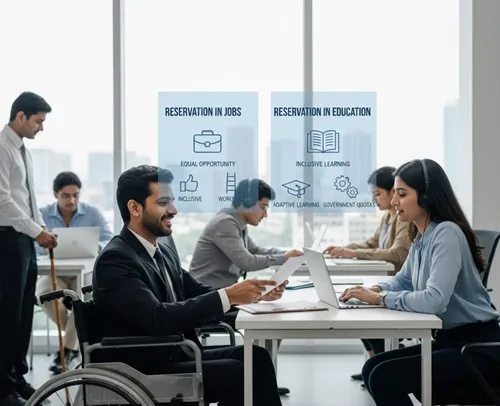
This Act is a law to protect and promote the rights and dignity of people with disabilities in India. It replaced the old 1995 law and includes 21 types of disabilities, like blindness, deafness, autism, intellectual disability, mental illness, and more.
Key Highlights:
- Reservation in jobs and education
4% of government jobs and 5% of seats in education are reserved for persons with benchmark disabilities (disabilities of 40% or more). - No discrimination allowed
Treating someone unfairly because of disability is illegal—in schools, jobs, transport, housing, or anywhere. - Accessibility
Buildings, transport, websites, etc., must be made accessible for people with disabilities. - Right to education and health
Children with disabilities have the right to free education until age 18. Equal access to health services is also required. - Guardianship
Provides for legal guardianship for people with severe disabilities who cannot make decisions on their own. - Penalties for abuse or discrimination
Includes fines and jail terms for offences like insulting, neglecting, or harming a person with a disability.
State-Wise Facilities & Reservations
| State | Job Reservation | Education Reservation | Transport Concessions | State Portal/Info |
|---|---|---|---|---|
| Delhi | 4% | 5% | Metro concessional fares | delhi.gov.in |
| Maharashtra | 4% | 5% | State buses | maharashtra.gov.in |
| Karnataka | 4% | 5% | KSRTC concessional passes | karnataka.gov.in |
| Tamil Nadu | 4% | 5% | TN State Transport | tn.gov.in |
| Uttar Pradesh | 4% | 5% | UPSRTC concessional tickets | up.gov.in |
Note: Benefits may vary slightly by state. Check state-specific disability portals for details.
FAQs: Rights of Persons with Disabilities Act, 2016
-
1. Who is covered under this Act?
-
Anyone with one of the 21 specified disabilities, including physical, mental, and intellectual disabilities.
-
2. What are the new disabilities added?
-
Autism, cerebral palsy, thalassaemia, sickle cell disease, acid attack victims, and more were added.
-
3. What is “benchmark disability”?
-
A person having at least 40% of a specified disability.
-
4. Is there job reservation for disabled persons?
-
Yes, 4% reservation in government jobs.
-
5. Are there education benefits?
-
Yes, 5% of seats are reserved in higher education institutions.
-
6. Can a child with a disability study in a normal school?
-
Yes, inclusive education is promoted, and free education is a right till age 18.
-
7. Is the private sector required to follow this Act?
-
Yes, especially regarding non-discrimination and equal opportunity.
-
8. What support is there for accessible infrastructure?
-
Government must ensure buildings, transport, and websites are disabled-friendly.
-
9. Can a disabled person file a complaint if discriminated against?
-
Yes, they can approach the Chief Commissioner for Persons with Disabilities or courts.
-
10. What punishment is there for discrimination?
-
Fine and imprisonment of up to 2 years, depending on the offence.
-
11. What are legal guardianship rights?
-
In some cases, a guardian can assist or represent the person in legal matters.
-
12. Are assistive devices and aids provided?
-
Yes, the government should provide and promote aids and appliances.
-
13. Is there a government ID or certificate?
-
Yes, persons with benchmark disabilities get a disability certificate.
-
14. Can disabled people get tax benefits?
-
Yes, under the Income Tax Act, certain exemptions apply.
-
15. Can people with mental illness claim benefits?
-
Yes, mental illness is recognised under the Act.
-
16. Are transport concessions available?
-
Yes, in railways and some state buses (varies by state).
-
17. Can disabled persons vote and contest elections?
-
Yes, they have equal political rights.
-
18. Is there a nodal officer in the offices to help?
-
Yes, public institutions must appoint grievance redressal officers.
-
19. Are private schools covered?
-
Yes, private schools must also follow inclusive education policies.
-
20. Where to complain about violation of rights?
-
You can file complaints with the District Disability Officer, State Commissioner, or court.
Add new comment